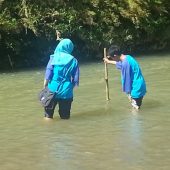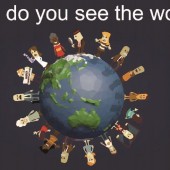
Water cycle literacy attracts great attention to the observers of climate change. Local and global impacts of the water cycle threaten human life and damage the Earth. Education is expected to be able to provide a way out of this problem. A Conservation-Based Learning (CBL) model was employed to understand the water cycle literacy among students in three cities in East Java province, Indonesia. There were 6 (six) Senior High Schools with a total number of 396 students serving as the sample. Each school consisted of common classes and CBL classes. Water cycle literacy aspects included knowledge, values, cognitive behavior, and acting behavior. The data were analyzed using a descriptive quantitative, and qualitative approach. The data were analyzed using a descriptive quantitative, and qualitative approach. The literacy aspect of values, attitudes, thinking, and acting skills in the water cycle in the CDL class is higher than that of the common class. Learning the water cycle using the CBL model gave significant effects on the students’ strengthening of water cycle literacy (sig. 0.5).
Continue Reading
Increased understanding amongst scientists and the general public about anthropogenic impacts in general, and climate change in particular, behooves us as educators to adjust our courses and curricula. “Sustainability” and “green” topics are increasingly being discussed and incorporated, but this should be done with deliberation. We undertook this study to understand attitudes, perceptions, and habits of the student body at Iowa State University, with a focus on environmental knowledge and behaviors. Overall, we found that, regardless of demographic, students appear to be interested in environmental topics, reducing their footprint, and improving the environment overall. But, they did not necessarily want to pay more, nor did they fully embrace personal responsibility.
Continue Reading
Abstract: Latest results in Education for Sustainable Development (ESD) research and practice show a tendency towards more holistic approaches aiming at deep transformation of the self and the meanings of human existence. Aligned with this, we present the Transdisciplinary Framework of Worldviews and Behaviours (TFWB) to describe the possible formation and expression of a worldview, a complex constellation of meaning and identity from which all human conduct emerges. Four key principles arising from the TFWB are: 1) The whole embodied nervous system is greater than the sum of its separated parts, especially when it comes to intelligence (information processing) and learning (meaning making); 2) The mind is a highly emotion-dependent and mostly unconscious entity; 3) A worldview is a unique arrangement of meaning each person builds, and lives through; and 4) Increasing self-awareness about how a personal worldview is formed and expressed generates increasing opportunities for that individual to explore and build a different meaning for their experience, or to explore and choose different forms to express it (behave). The TFWB informs a new perspective on learning that could be useful for the achievement of ESD’s transformative goals, guiding the innovative design of educational initiatives encouraging new conceptualizations about the meanings of being human; thus, facilitating potential behavioural transformations toward a more sustainable existence.
Continue Reading